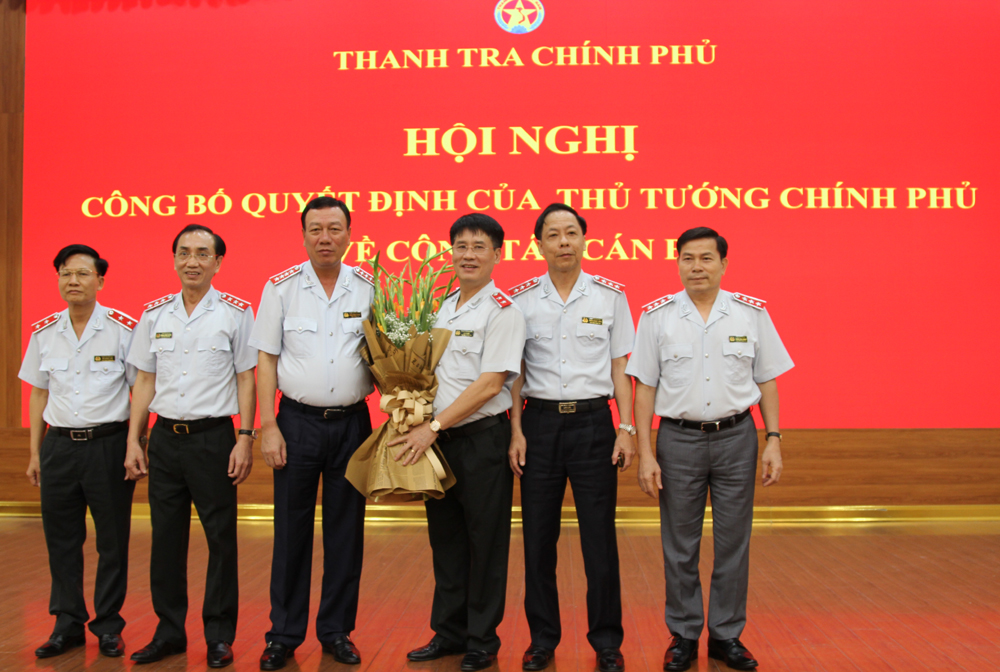Procedures for submission to Government Inspectorate Leaders in Vietnam
What are the procedures for submission to Government Inspectorate Leaders in Vietnam? - Hoai An (Dong Nai)

Procedures for submission to Government Inspectorate Leaders in Vietnam (Internet image)
Regarding this issue, LawNet would like to answer as follows:
1. Procedures for submission to Government Inspectorate Leaders in Vietnam
Procedures for submitting to the Government Inspectorate Leaders in Vietnam according to Article 20 of the Regulations issued together with Decision 416/QD-TTCP in 2019 are as follows:
- Units are responsible for sending documents to the Government Inspectorate Leadership through the Office in paper or electronic copies for checking and processing before submitting them to the Leadership (for confidential documents, only send paper copies). The submission form is signed by the leader of the submitting unit.
- Dossier submitted to the Government Inspectorate Leader clearly presents the content and proposes a solution to the work.
For issues related to the functions and tasks of other units or requiring coordination to resolve work, the submitted dossier must include opinions from relevant units, clearly stating issues on which there are different opinions and opinions expressing the views of the submitting unit.
- The Office coordinates with the Secretary of the Government Inspectorate to check the procedures and format of project documents and submitted documents:
+ Checking the procedures and format: if the project dossier and documents submitted do not comply with regulations within no more than 01 working day, the Secretary leading the Government Inspectorate will transfer them to the Office (General Administration Department) to send back to the submitting unit, requesting compliance with regulations.
For issues that need to be resolved urgently, notify the unit submitting additional documents and report to the Government Inspectorate Leader.
+ For documents that comply with procedures within 01 working day from the date of receipt (unless otherwise requested), the Office forwarded the Secretary to the Government Inspectorate Leader for comments on the submission form.
- The office opens a book to monitor submissions during work processing.
2. Responsibilities, scope, and methods of handling the work of the Government Inspector General
Responsibilities, scope, and methods of handling the work of the Government Inspector General according to Article 3 of the Regulations issued together with Decision 416/QD-TTCP in 2019 are as follows:
- The Inspector General is a member of the Government, the head of the Government Inspectorate, and is personally responsible to the Prime Minister, the Government, the National Assembly, and the law for all assigned state management activities; also directs and manages the Government Inspectorate to properly perform functions, tasks, and powers according to regulations.
- Scope and method of handling the work of the Inspector General:
+ Directly handle work under the management scope of the Government Inspectorate, including tasks assigned to Deputy Inspectors General of the Government (hereinafter referred to as Deputy Inspectors General), but the Inspector General finds it necessary to resolve it because the content is urgent or important; matters where there are still differences of opinion between two or more Deputy Inspectors General;
+ Assign Deputy Inspectors General to monitor, direct, and resolve a number of tasks, fields, and work areas and be directly in charge of a number of units under the Government Inspectorate; including a Deputy Inspector General who directs, processes documents, and coordinates the agency's daily work;
+ When the Inspector General is absent, or if necessary, authorize the Deputy Inspector General to handle daily work on behalf of the Inspector General to manage the agency's work; The Inspector General directly directs the handling of work or assigns another Deputy Inspector General to handle the work assigned to the absent Deputy Inspector General;
+ Decide according to authority or submit to the Government, Prime Minister or competent agencies to consider and decide on issues related to the functions and tasks within the field of management of the Government Inspectorate;
+ Every week, the Inspector General has a specific work schedule. Deputy Inspectors General and heads of relevant units adjust their work according to the Inspector General's work schedule. In case the Deputy Inspector General or the Head of the Unit cannot adjust the work according to the Inspector General's working schedule, the report will seek the opinion of the Inspector General;
+ Directions and conclusions of the Inspector General; Notices of instructions and conclusions at meetings, conferences, and working sessions of the Inspector General must be seriously organized and implemented. In cases where directions and conclusions cannot be implemented, Deputy Inspectors General and Heads of Units report to the Inspector General;
+ Sign documents under the authority of the Inspector General;
+ In addition to the above methods of handling work, the Inspector General solves work through: business trips; inspecting and urging the implementation of local policies and laws and the enforcement of legal documents related to the scope of state management of the Government Inspectorate; explaining and answering questions from National Assembly deputies; Respond to recommendations from localities, voters, people, and businesses; press conferences; receiving citizens; receiving civil servants and public employees of the agency; and other forms of handling work.
- The Inspector General has a collective discussion within the Government Inspectorate Leadership before deciding on the following issues:
+ Strategy, planning, and development plan for the inspection industry;
+ Annual work program of the Government Inspectorate and the Inspection industry; draft legal documents submitted to the Government, the National Assembly Standing Committee, and the National Assembly;
+ Orientation of the inspection program and annual inspection plan of the Government Inspectorate;
+ Issuance regarding the organizational structure and personnel of the Government Inspectorate according to regulations;
+ Results of large-scale socio-economic inspections involving many levels and sectors according to programs, plans, and assignments by the Prime Minister;
+ Results of considering and resolving complaints and denunciations from citizens, when requested by the Deputy Inspector General in charge of the field;
+ Report summarizing the implementation of the annual work plan of the inspection sector; report reviewing the executive direction of the Government Inspectorate leaders;
+ Issuance of negotiation, signing, accession, and implementation of international treaties and international agreements; plan to implement international commitments of the Government Inspectorate;
+ Other issues as prescribed by law or as the Inspector General finds it necessary to discuss.
+ In cases where collective discussion is not organized, the presiding unit coordinates with relevant units, consults with Deputy Inspectors General, and then submits to the Inspector General for decision.
- Key word:
- Government Inspectorate
- in Vietnam
- Cases of land rent exemption and reduction under the latest regulations in Vietnam
- Economic infrastructure and social infrastructure system in Thu Duc City, Ho Chi Minh City
- Regulations on ordination with foreign elements in religious organizations in Vietnam
- Increase land compensation prices in Vietnam from January 1, 2026
- Determination of land compensation levels for damage during land requisition process in Vietnam
- Who is permitted to purchase social housing according to latest regulations in Vietnam?
-

- Emergency response and search and rescue organizations ...
- 10:29, 11/09/2024
-

- Handling of the acceptance results of ministerial ...
- 09:30, 11/09/2024
-

- Guidance on unexploded ordnance investigation ...
- 18:30, 09/09/2024
-

- Sources of the National database on construction ...
- 16:37, 09/09/2024
-

- General regulations on the implementation of administrative ...
- 11:30, 09/09/2024
-

- Notable new policies of Vietnam effective as of ...
- 16:26, 11/04/2025
-
.Medium.png)
- Notable documents of Vietnam in the previous week ...
- 16:21, 11/04/2025
-
.Medium.png)
- Notable documents of Vietnam in the previous week ...
- 16:11, 02/04/2025
-
.Medium.png)
- Notable new policies of Vietnam to be effective ...
- 16:04, 02/04/2025
-
.Medium.png)
- Notable new policies of Vietnam effective from ...
- 14:51, 21/03/2025

 Article table of contents
Article table of contents
